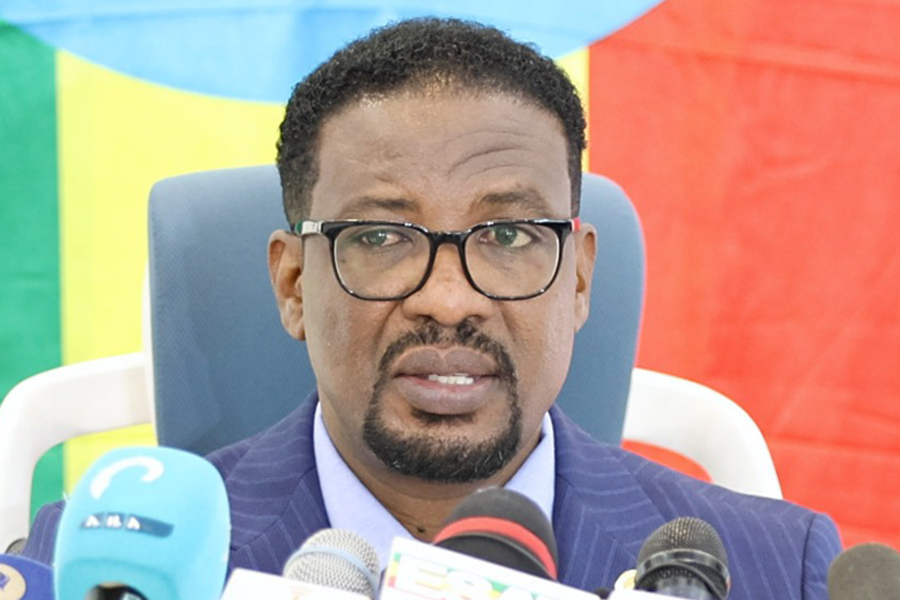
A hearing at the Federal High Court in Ledeta involves a quarry operator who has been negatively impacted by a road contractor that dumped excavated waste material from a nearby highway construction project into an active quarry site.
The contractor has brought charges of illegal dumping on its concession site against the contractor and calls a superintendent and an equipment operator as witnesses. In turn, the contractor’s lawyer presents evidence that a local weredaofficial has permitted the disposal of the material in the quarry.
“Have you exhausted the extraction work at the site at the time of the alleged violation?” the judge inquires of the superintendent after briefly reviewing the evidence.
“No. We had just moved our operations to the southern face of the ridge when they dumped the construction waste. There is still much more material to be mined underneath the refuse, and we intended to return to it,” explained the superintendent.
He then testifies as to the extent of the damages caused by the action and how he and his crew had pleaded with the contractor to stop the violation. When the equipment operator is sworn in, he too, corroborates the previous testimony and volunteers an hourly figure of what it will cost to remove and dispose of the waste.
The lawyer for the defendant pounces to action at this and demands to know how he could possibly know the figure.
Economic growth that comes at the expense of the degradation of natural resources should not count as development. A nation's strength and survival depends on how well natural resources are protected, which should be recognised as a national duty.
“Are you qualified to make an estimate? An engineering estimate, to boot?” he demands.
“I am in the trade, and I know the hourly figures to run the machinery, the fuel and labour costs, as well as what it takes to complete the job.”
“But are you qualified to state engineeeeering estimates?” demands the defendant’s lawyer, hissing on the word ‘engineering,’ screwing his face with incredulity and a glow of triumph on his face.
“Yes. Much as you are dabbling in lawyering here, I am qualified for establishing construction estimates,” retorts the equipment operator to a general chuckle of approval in the courtroom.
It is not uncommon for road contractors to lacerate and gouge the nearest ridge or hill to extract building material and then leave gashing cavities that deface and mar the ancient landscapes of Ethiopia. They perform de rigueur formalities to obtain permits from backwater local wereda offices that lack the ability to enforce modern resource conservation measures.
The disfigured mountainsides and ridges that dot the Ethiopian countryside are witnesses to this negligence. On either side of the southern highway toward Adama or along the Weldia Road to the north, the consequences of unregulated and uncontrolled stone and gravel mining sites glare at us as blots and tokens of our failure to protect our natural resources.
The environmental implications of unfettered quarrying in Ethiopia have been well documented in a 2017 Addis Abeba University Master’s thesis by Yayesh Mihiretie.
During a 21-year period studied, “in all land use and land cover classes, urbanisation expanded by more than 4-fold, [while] quarrying activities rose by more than 10-fold.”
The conclusion of the thesis is that “future expansion of urban centres will lead to extensive quarrying activities,” and the result will be the continued degradation of both the human and natural environment.
This should be a clarion call to us. The last three decades have witnessed the gross mismanagement of our natural resources, pushing to near-extinction of what little remains of our forests, rivers and wilderness areas.
Large sections of vegetated areas across the country, from the South to the lowlands of the Amhara Regional State, have seen native species of Acacia woodlands decimated for charcoal production; fertile farmlands across the highland plains are carved up to give way to factories; condominiums, housing projects and industries disgorge with impunity their toxic waste directly into waterways; and the list of wanton, disaster-prone quarrying sites are growing by leaps and bounds, threatening the once stable landforms.
Faced with a similar national disaster almost 111 years ago, Theodore Roosevelt, the 26th president of the United States, gathered the governors of each State, natural resources experts, representatives of civic organizations, federal legislators, the entire Supreme Court, his Cabinet and leaders of agencies dealing with waterways and land to the White House and addressed them with his memorable speech, “Conservation as a National Duty.”
Roosevelt declared that the conference was in effect “to consider the weightiest problem now before the nation - the fact that the natural resources of our country are in danger of exhaustion if we permit the old wasteful methods of exploiting them.”
He argued that without foresight the nation cannot be civilized or developed.
“Prosperity depends directly on the energy and intelligence with which our natural resources are used. In a word, we have unnecessarily diminished the resources upon which not only our prosperity but the prosperity of our children must always depend.”
Our survival here in Ethiopia depends upon how well we protect our natural resources, and it is at our own peril that we exhaust and plunder it.
Our rivers, streams, brooks and creeks have all but vanished, or they stand in utter neglect and ruin. Our soils have lost their fertility to erosion, poor construction practices and mismanagement. Our farmlands are carved out, gouged and partitioned. And as for our forests, alas, it may already be too late to save them.
To conserve what remains of our natural resource heritage in Ethiopia, we need Prime Minister Abiy Ahmed (PhD) to call an assembly of officials, politicians, civic society and experts, as did Roosevelt more than a century ago, to establish conservation as a national consensus.
PUBLISHED ON
Mar 02,2019 [ VOL
19 , NO
983]


Radar | Dec 01,2024

Fortune News | Oct 31,2020

Commentaries | Mar 23,2019

Advertorials | Mar 06,2023

My Opinion | Jun 08,2024

Radar | Dec 16,2023

Viewpoints | Feb 09,2019

Radar | Nov 11,2023

My Opinion | Aug 08,2020

Radar | Aug 24,2019

Dec 22 , 2024 . By TIZITA SHEWAFERAW
Charged with transforming colossal state-owned enterprises into modern and competitiv...

Aug 18 , 2024 . By AKSAH ITALO
Although predictable Yonas Zerihun's job in the ride-hailing service is not immune to...

Jul 28 , 2024 . By TIZITA SHEWAFERAW
Unhabitual, perhaps too many, Samuel Gebreyohannes, 38, used to occasionally enjoy a couple of beers at breakfast. However, he recently swit...

Jul 13 , 2024 . By AKSAH ITALO
Investors who rely on tractors, trucks, and field vehicles for commuting, transporting commodities, and f...

Jun 28 , 2025
Meseret Damtie, the assertive auditor general, has never been shy about naming names...

Jun 21 , 2025
A well-worn adage says, “Budget is not destiny, but it is direction.” Examining t...

Jun 14 , 2025
Yet again, the Horn of Africa is bracing for trouble. A region already frayed by wars...

Jun 7 , 2025
Few promises shine brighter in Addis Abeba than the pledge of a roof for every family...